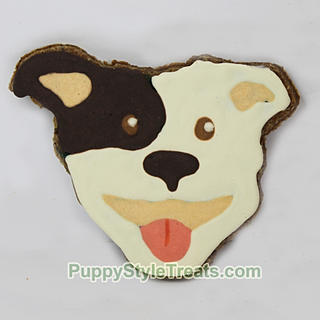Is Grain-Free Dog Food Better for My Dog?
- Puppy Style Treats and More
- May 29, 2020
- 3 min read

It has been a hotly debated issue and even led to a popular new trend in commercial dog foods. But bottom line, is grain-free dog food better for our canines?
A lot of my customers ask for grain-free treats because they believe it is healthier for their dog or their vet recommended a grain-free diet. They have expressed concerns about claims that grain-free food creating heart problems in dogs fed grain-free foods so we tried to find out more about it. This potential heart issue is called DCM or dilated cardiomyopathy. It is a form of K9 heart disease that affects the heart muscle decreasing its ability to effectively pump blood leading to an enlarged heart and potentially congestive heart failure.
Like most issues, this controversy is not simply black or white. Many dogs have eaten commercial dog foods with grains and enjoyed long, healthy and active lives but others eating the same commercial dog foods have exhibited some health issues – including DCM.

Grains and Dogs: The Facts
Why are Grains Even in Commercial Dog Foods?
Grains began appearing in pet foods approximately 70 years ago when consumers wanted convenience in feeding their pets and commercial pet food manufacturers wanted to reduce costs by using cheaper grains as fillers (which also offered a longer shelf life).
For some dogs, grains can trigger allergies.
Typically, grains identified as allergy-provoking ingredients include:
- Wheat - Barley - Soy - Oats - Rice - Corn - Rye
Food allergies do not always indicate an allergy or intolerance to grains. Many dogs are allergic to protein sources including:
- Beef - Chicken - Eggs - Dairy - Fish - Lamb
Canine allergic reactions can also be due to:
Pet food fillers (potatoes, grains, starches and fibers)
Storage mites in dry dog food in non-sealed containers
Hooves, feathers and beaks
Emulsifiers, flavor enhancers, dyes, preservatives and other chemicals
Conclusion: There Isn’t One
In the December 1, 2019 issue of the Journal of the Veterinary Medical Association, Dr. Lisa M. Freeman of Tufts University emphasized the DCM issue is not just about grain-free diets and may also include other pet food trends called BEG such as:

- Boutique diets
- Exotic ingredients (Kangaroo, Bison, etc.)
- Grain-free diets
In the FDA’s 2019 update on diet-associated DCM, they revealed that more than 90% of the dog foods reported in the DCM cases were grain-free.
Dr. Freeman cautions:
“The apparent link between BEG diets and DCM may be due to ingredients used to replace grains in grain-free diets, such as lentils or chickpeas, but also may be due to other common ingredients commonly found in BEG diets, such as exotic meats, vegetables, and fruits.”
These other factors can include:
Taurine deficiency
Breed predisposition, genetics and metabolic abnormalities
Diet history, ingredients and nutrient-profile

What Is a Dog Owner to Do?
Every pet guardian wants the absolute best for their pet. So, should you feed your dog a grain-free diet to protect his health and overall well-being? Some of our customers told us they are choosing to alternate between a grain-free and a regular diet.
Work with your regular veterinarian – or a holistic one - when it comes to your pet, their nutritional requirements and the best high-quality diet. Keep a close eye on their health with regular screenings and health checks to catch any health issues early.
And remember …
“Marketing is a powerful tool for selling pets foods and has initiated and expanded fads that are unsupported by nutritional science, including grain-free and exotic ingredient diets.”
(Dr. Lisa Freeman, Tufts University)
We offer both grain-free and gluten-free treats so there is something for everyone! Check it out HERE.
Additional Reading:
Cummings School of Veterinary Medicine at Tufts University: Risk of Heart Disease in Boutique or Grain-free Diets and Exotic Ingredients
Dr. Deborah Shores, DVM: Ask a Vet, Is Grain-Free Food Bad for Dogs?
PetFoodIndustry.com: 119 Dog, 5 Cat DCM Deaths Reported to FDA Investigation
Image Credits (In Order of Appearance):






















Comments